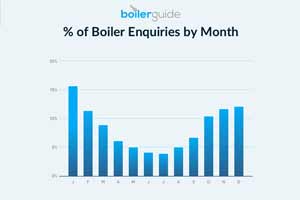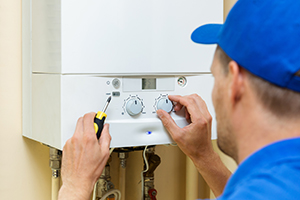The big smoke: A boiler breakdown

The figures, which have been compiled by Boiler Guide as part of its ‘Boilers on the Blink’ campaign to encourage homeowners to review their boilers following winter and make repairs while engineers are in lower demand, found that 6.1%* of properties in London had experienced a boiler breakdown since 2009. The West Midlands (6%) and the North East (5.6%) followed the closest behind, suggesting that residents in these areas need to pay closer attention to their boilers to ensure they can make any repairs or replacements before it’s too late. At the other end of the scale, boilers were least likely to break down in Yorkshire (4.3%), ahead of Scotland (4.4%) and the North West (4.8%). Full results: Commenting on the results, Founder of Boiler Guide David Holmes, said: “London is synonymous with having an abundance of ‘older’ residential and commercial properties, with many containing older heating systems that are in dire need of repair. Couple these with the higher occupancy rates and the dense population of the region, the strain put on boilers and other home heating systems is hard to ignore. It’s likely that the temperature in each region will also have an impact on the final figures. While London is, on average, one of the warmest areas of the UK, this also means that boilers are switched off and left dormant for longer periods throughout the spring and summer, which is when more repair issues can occur.” The report also found there was a clear link between the percentage of home ownership and the amount of boiler repair enquiries made, with areas dominated by rental properties such as in London, the North East and the West Midlands more likely to experience a breakdown. This is likely due to tenants not paying a close eye on the condition of their boiler, or not living in a property for a long enough time to notice any changes. David, adds: “While the cost for the repairs or replacement of a boiler is the responsibility of the homeowner or landlord, tenants should keep an eye out for the signs and symptoms of a faulty boiler. A boiler that is performing to its full potential will not only create a warmer, cosier home to live in, but it can also reduce energy costs by hundreds of pounds a year for residents.” Why is Summer the Best Time to Get Your Boiler Repaired or Replaced? Although demand for boiler services, repairs and replacement is lower between March to October, this is actually the best time to get these jobs carried out. Here are a few reasons to go against the trend and get your boiler repaired in the summer. Heating engineers and companies are often less busy during the summer and may offer more competitive prices. You should find it easier to get an appointment time that suits you. Having work carried out on your boiler means it will need to be turned off; if you have to go without heating and hot water, it makes much more sense to do it in the summer. If a boiler breaks in winter you will be without heating and hot water until it can be fixed. Getting things sorted ahead of the winter will give you real peace of mind that your boiler is in good condition before it’s tested by the freezing temperatures ahead. You should get to know how your boiler works and to recognise when there might be a problem. Listen for odd noises and if the boiler seems to be struggling to reach a high enough temperature, don’t ignore it as it’s unlikely things will get better without some maintenance or a repair. For more information and the full results on the Boiler Guide research, click here *These figures are based on the total amount of boiler repair of enquiries received by Boiler Guide between 2009-2019 and divided by the total number of properties in each region (based on ONS statistics).
PREDICTING THE FUTURE OF HOME HEATING

David Holmes, Founder of Boiler Guide talks about the problems with the current solutions available and identifies some of the new innovations set to shape how we heat our homes in the future. The Problem In very simple terms, the problem with using fossil fuels for heating can be broken down into 3 parts: Burning fossil fuels produces carbon emissions; this is causing global climate change which is now an international concern. Fossil fuels are running out. Fossil fuels are a costly fuel for homeowners to rely on. We need to completely overhaul the way we generate both electricity and heat for our homes by switching to renewable energy, i.e. energy which is naturally sourced from our planet and will naturally replenish in a human time scale. In 2008, the UK government passed the Climate Change Act in an effort to achieve an 80% reduction in carbon emissions by 2050 while simultaneously: Keeping energy bills as low as possible; Ensuring the UK has a secure and resilient energy system; Avoiding unreasonable upfront costs for homeowners. The writing is very much on the wall for traditional oil boilers as the government would like to see them phased out by 2025 (although OFTEC are working to find a low carbon liquid fuel to replace oil so homeowners avoid having to replace their whole heating system) and natural gas boilers are heading for the same fate by 2050. However, the big question remains unanswered: how will be heating our homes in 2050? The Potential Solutions Air Source and Ground Source Heat Pumps use on a small amount of electricity to draw natural heat from either the air or ground (even in temperatures as low as -20°C) to produce hot air or hot water for taps and central heating systems. Biomass Boilers are fueled by solid biological material such as wood logs, chips or pellets rather than gas or oil. Burning wood is a carbon neutral process which means it only produces as much carbon as the tree absorbed while it was growing. Solar Thermal Panels are installed on the roof and use heat from the sun to produce hot water for heating and taps. Solar PV Panels with electric heating could enable us to harvest energy from the sun to power electric heating systems. Hydrogen Boilers produce no emissions creating only water vapour and heat. 1kg of hydrogen has the same amount of energy as 2.8kg of gasoline. Switching from the gas network to a hydrogen one seems the logical solution, but that’s not without its challenges. Hydrogen is highly flammable and, while it emits zero emissions when burner, the process of creating it does produce carbon. A massive production system of steam methane reformers will need to be developed to capture the carbon so it doesn’t get released into the atmosphere. What’s the Future of Home Heating? New builds are our best opportunity to ensure renewable heating is integrated into our homes for future generations, but the decarbonisation of existing homes is more complex. The CCC (Committee on Climate Change) has recommended an interesting 2-stage approach to the issue: Stage 1: Alongside improvements to insulation, we install air or ground source heat pumps to generate the bulk of the home’s hot water while keeping gas boilers in situ as a backup. Stage 2: Gradually replace gas boilers with hydrogen boilers as the technology becomes more widely available and hydrogen stores are built up. Lord Deben, Chairman of the CCC, recently commented on the urgency of the issue if the UK is to meet the 80% carbon reduction target: “The time for the Government to move from theory to practice has arrived […] The future now rests on Government making a quick decision and fully committing to low-carbon heat within the next three years.” For more information about Boiler Guide, please clcik here. Boiler Guide is the smarter way for UK homeowners to find and compare new boiler quotes from local, Gas Safe and trustworthy heating engineers.




